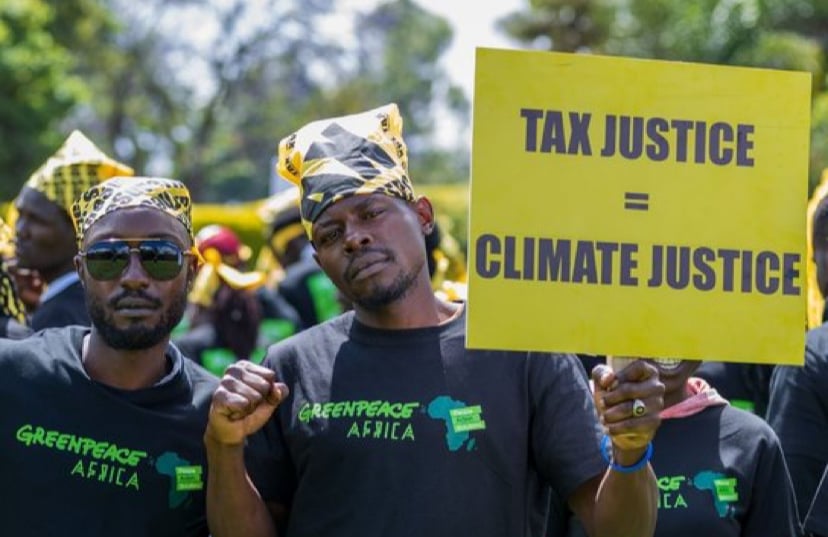Many Greenpeace Africa volunteers met in Nairobi, Kenya, on Friday to demand urgent global tax reform at the United Nations Tax Convention (UNTC).
The demonstrators displayed a “Tax the Super-rich for People and Planet” banner, calling on governments to ensure billionaires and oil and gas corporations pay their fair share to support climate action, nature protection, and sustainable development.
Speaking at the event, Nina Stros, policy expert at Greenpeace International and head of delegation, said the current global tax system is “outdated and unjust”, allowing the ultra-wealthy and polluting industries to profit while fuelling the climate crisis.
“The system allows the super-rich and polluting oil and gas corporations to profit while avoiding paying their fair share and fuelling the climate crisis through their excessive emissions. This has to change,” Stros said.
Advertisement
“Governments must deliver strong commitments with clear mechanisms to tax polluting billionaires and corporations. Instead of a race to the bottom with continuous lowering of corporate tax rates, it’s time to adopt global tax rules that hold super rich individuals and polluting corporations to account.”
The UNTC’s third round of negotiations, holding from November 10 to 19, coincides with the COP30 climate summit in Belém, Brazil, where world leaders are debating how to bridge the 1.5°C ambition gap and deliver the $300 billion annual climate finance commitment made at COP29.
The advocates said the UN tax talks present a unique opportunity to raise the needed public finance by reforming global tax structures that currently favour the wealthy and fossil fuel giants.
Advertisement
Fred Njehu, fair share global political lead at Greenpeace Africa, said governments must end the era of tax avoidance by the rich and powerful, who he argued are depriving citizens of vital resources for sustainable development.
“The world is not a billionaire’s playground for them to get richer at the expense of our health, security, and democracy,” Njehu said.
“Governments must act now to stop the super-rich stashing billions in tax havens, and to put an end to polluting corporations paying too little tax. It’s time to direct these funds to public services and tackling the climate and ecological crisis.”
Murtala Touray, programme director at Greenpeace Africa, described the Nairobi talks as a historic moment to reshape the global economic system so that it serves all nations, not just a few wealthy countries.
Advertisement
He said the group initiated the process to push for a legally binding UN tax convention that addresses inequalities in global finance and governance.
“These injustices are preventing many countries of the Global South from raising revenues that could support better public services, climate mitigation and adaptation and nature protection,” he said.
“Africa is calling for a clear path to tax justice – a commitment to sustainable development rooted in fair taxation of corporations and high-net-worth individuals. Because tax justice isn’t charity, it’s a fundamental right and the essence of our sovereignty.”
GAPS IN GLOBAL TAX JUSTICE AND GREENPEACE’S DEMANDS
Advertisement
According to Greenpeace, the world loses an estimated $492 billion every year as multinational corporations and ultra-wealthy individuals exploit tax havens to underpay taxes.
In extractive industries such as oil, gas, and mining, governments reportedly forfeit at least $44 billion annually in tax revenues due to profit shifting.
Advertisement
The campaigners argue that these losses directly undermine climate action and sustainable development goals by depriving countries in the global south of resources needed to fund clean energy, healthcare, education, and environmental protection.
Greenpeace estimated that a permanent “polluter profits tax” on oil and gas corporations could raise up to $400 billion in its first year, while a modest 5 percent tax on multimillionaires and billionaires could generate $1.7 trillion annually for global public finance.
Advertisement
To close these gaps, the organisation called on negotiators at the UN Tax Convention to adopt binding commitments that ensure fair and progressive taxation.
The group’s proposals include higher taxes on high-net-worth individuals, environmental levies in line with the polluter-pays principle, and a global tax on fossil fuel company profits.
Advertisement
Greenpeace said revenues from such reforms should be channelled into multilateral climate funds and national budgets to strengthen public services, fund adaptation and mitigation programmes, and support communities most affected by the climate crisis.






